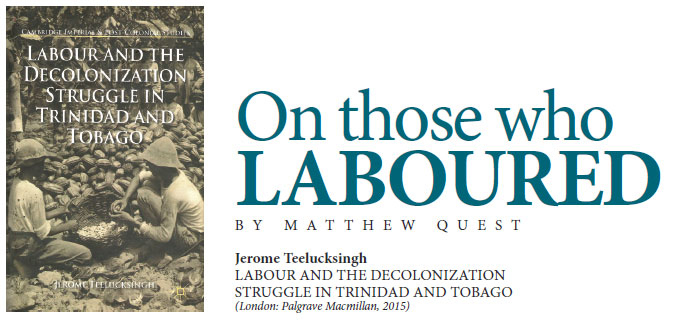

Labour and the Decolonization Struggle in Trinidad and Tobago examines T&T’s early labour organizations and trade unions from the 1920s to the 1950s. A particular focus is the Trinidad Workingmen’s Association (TWA), later known as the Trinidad Labour Party (TLP), in the evolution of the colony’s identity and culture. This volume tracks contributions to the rise of the well-known general strike of 1937 and subsequent cohesion, building toward the Caribbean Labour Congress, an early advocate of Caribbean federation. The book is particularly strong in its survey of the impact of gender, religion, and the popular labour songs of these toilers, and how these labour organizations boldly advocated for them increasingly as a voting bloc.
Teelucksingh offers a nuanced view of multi-racial labour, observing Afro-Trinidadian and Indo-Trinidadian labour on their own authority. He offers perspectives on major labour personalities such as Arthur Cipriani, Krishna Deonarine (Adrian Cola Rienzi), Elma Francois, and Tubal Uriah Butler. He also highlights personalities not given as much focus such as F.E.M. Hosein, Timothy Roodal, and C.B. Mathura. Hosein denounced Crown Colony government’s racial logic as a benevolent despotism. Roodal condemned great wealth disparities and divisions even where fellow ethnics exploited “their own people.” C.B. Mathura fought for Indo-Trinidadian workers to build multi-racial and distinctly Indian-oriented labour groups, instead of seeking colonial patronage or identifying with racial or religious chauvinisms in their community.
The TWA/TLP recognized women’s workplace rights, mobilized their participation in public meetings and rallies, and defended women’s right to vote. The author recognizes progressive similarities between British Fabianism and the TWA/TLP approach toward women, recording activists such as Cecilia Yearwood, Cecilia Urquart, and Mrs. Alkins.
Placing this crucial period of national history in conversation with regional labour movements found in Guyana, Grenada and Jamaica, Teelucksingh shows how the TWA wished for links with the British Labour Party to influence Crown Colony Government.
Teelucksingh asks if the unemployed and marginal toilers in Trinidad understand fully the implications of labour songs which spoke of their blood and damnation. These labour songs do not elevate the explosive self-governing potential found in the 1937 Fyzabad strike.
Teelucksingh explains that Elma Francois’s national unemployed movement and Negro Welfare Cultural and Social Association (NWCSA) were major turning points in the colony’s labour movement that desired to smash this mediation.
I disagree with Teelucksingh that disputes among the labour movement in the conferences for federation leading up to the Caribbean Labour Congress, prevented a united front in opposing Britain. There was not great desire for immediate self-government among middle class nationalists, who increasingly spoke for labour. Certainly they never thought of direct self-government for the masses. For the elite increasingly had the coveted positions, and most often saw workers below them like a colonial official. At times they articulated the call for greater human rights but does not global capitalism conquer under this premise today? It must have a pre-history in other colonial and anti-colonial administrative strategies.
Perhaps in the 1930s the Trinidad working and middle classes could unite for a final moment against colonialism. But shortly after, they did not belong in the same party. One social class policed and repressed another in the name of a benevolent despotism.
Teelucksingh concludes that the working class – but overwhelmingly he means the trade union bureaucracy and those who spoke before Parliament – had a prominent role in decolonization. When he speaks of “the true soldiers of the movement for responsible government” and “the scarred warriors for economic, social, and political liberation,” the author is referring to a separation of “the cadre of labour leaders who with the masses of the African and Indian working class…” expose unexamined problems that future rank-and-file, not trade union staffers, will have to unravel.
Matthew Quest is a Lecturer in Africana Studies at University of Tennessee at Knoxville, USA. |





